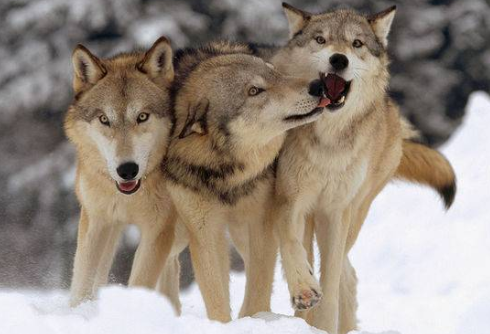(单词翻译:单击)
If you need help herding some sheep or retrieving a stick, you can count on your canine companion. Because dogs always seem to be keen on lending a paw.
如果你需要放羊或者捡回个棍子,你可以让狗狗去做这些事情。因为狗狗非常喜欢帮助你。
But only if their partner is a person. When it comes to cooperating with one another, dogs are truly lost…and instead it's wolves who've mastered the art of teamwork. That's according to a study in the Proceedings of the National Academy of Sciences.
但是,前提条件是狗狗的合作对象是人,如果是和别的什么合作的话,狗狗会不知所措……而相反,狼却有团队合作的精神。这是发表在《美国科学院论文集》杂志上的一项研究指出的。
For thousands of years, humans have been breeding dogs that can do all sorts of neat tricks. And because pups aim to please, we've come to think that domestication has somehow boosted dogs' powers of cooperation.
数千年以来,人类一直饲养可以掌握各种技能的狗狗。因为,小狗狗的目的是取悦人类,所以,我们认为驯化狗狗可以提高狗狗的合作能力。
But researchers in Austria have been wondering whether that notion could be barking up the wrong tree. Because left to their own devices, dogs are bigger loners than wolves.
但是,奥地利的研究人员认为,这个观点是不对的。因为根据他们的研究结果证明,狗狗比狼更孤独。
"So wolves live in closely knit family packs, they cooperate in raising the young, they also cooperate in hunting and in defending their territories. So they really have a strong dependence on cooperation in many aspects of their lives."
“狼生活在紧密的家庭关系中,它们共同养育小狼崽、共同捕获猎物、共同守护家园。所以,狼在生活的各个方面,对合作能力有很强的依赖性。”

"In contrast, to this free ranging dogs actually forage mostly by themselves solitarily. It's only mothers that raise their young. And they do form packs but they tend to be somewhat more fluid, if you want."
“然而,对于自由放养的狗狗来讲,实际上,它们会各自找各自的食物。只有狗妈妈会抚养小狗狗。狗狗们也会形成团体,但实际上狗狗有独立性。”
That's Sarah Marshall-Pescini of the Wolf Science Center at the University of Vienna. She and her colleagues decided to test dogs' and wolves' relative powers of cooperation.
莎拉·马绍尔-佩希尼在维也纳大学狼科学研究中心工作。她和同事们决定测试一下狗和狼的合作能力。
In the setup, a pair of animals…either two dogs or two wolves…is presented with a contraption that will allow the participants to access a tray of food…but only if both members of the team simultaneously pull on the two ends of a rope.
在实验中,将两只狗分为一组、将两只狼分为一组,并且为它们提供了一个巧妙的装置,这些狗和狼可以通过装置吃到一盘食物……但是需要团队中的成员同时拉绳子。
A dozen wolves and 14 dogs took the challenge. And the results? The wolves ran circles around their doggie descendants. In some 400 attempts, the wolf teams scored a snack 100 times.
12只狼和14只狗狗参加了这个实验测试。最后的结果是,狼轻而易举的就胜过了狗狗。在大约400次测试中,狼组成功获得了100次食物。
Which may not sound all that impressive…until you compare it with the doggie duos, who, in nearly 500 trials, succeeded only twice.
这个结果听起来可能不那么出色,但是如果和狗狗那组进行比较的话就相当出色了--在将近500次的试验中,狗狗们仅仅成功了2次。
Now, it's not that dogs are less avid learners. Or that they turned tail and avoided the apparatus. Marshall-Pescini says the pooches were curious about the device.
这并不是说狗狗不爱学习。也不是因为它们摇了摇尾巴,避开了仪器。莎拉·马绍尔-佩希尼称,杂种狗对于这种装置有很强的好奇心。
"What seemed to be happening was they didn't want to get into conflict with each other. So they wouldn't both go and try things on it but rather took it in turns. And this really hindered their capacity to cooperate."
“似乎双方并不想发生冲突。所以,它们不会一起去尝试,而是会轮流尝试。这就阻碍了它们的合作能力的培养。”


